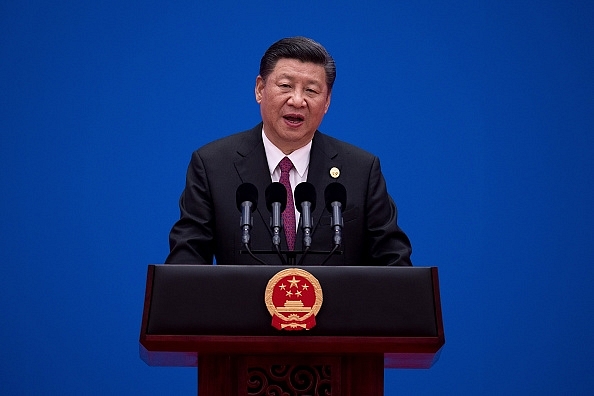News Brief
Xi Jinping's Military Shake-Up: Focus On Cyber Warfare With New Information Support Force; Here's All About It

Xi Jinping speaking at a Belt and Road Initiative conference in Beijing. (Photo by Nicolas Asfouri-Pool/Getty Images)
Chinese President Xi Jinping has initiated the most significant restructuring of the country's military since 2015, with profound implications for units specialising in cyber warfare.
According to a report from The Economic Times, China will dissolve the Strategic Support Force, established over eight years ago to bolster capabilities in space, cyber, political, and electronic warfare.
In its place, Xi has authorised the formation of a new branch called the Information Support Force.
This restructuring involves elevating the aerospace and cyber units, formerly part of the Strategic Support Force, to organisational parity within the newly established Information Support Force.
The aerospace division will enhance China's space capabilities and oversee crisis management in space, as outlined by the defence ministry.
This strategic overhaul occurs amidst intensifying global competition, particularly with the US, where cyber warfare has become a focal point.
Last month, China faced accusations from the US, UK, and New Zealand of sponsoring malicious cyber activities targeting democratic institutions.
Asserting the Communist Party's supremacy over the military, Xi emphasised the new force's role in coordinating cyber information system development.
Li Wei, the former political commissar of the now-disbanded Strategic Support Force, will retain this position in the Information Support Force, affirming his commitment to adhering to Xi's directives. Bi Yi, as reported by state television CCTV, has been appointed as the commander of the Information Support Force.
These adjustments aim to align China's military with modern warfare's informational requirements, according to Cao Weidong, a retired senior researcher at the PLA Naval Research Academy.
This latest restructuring follows President Xi's extensive military personnel changes last year, widely interpreted by US intelligence analysts as a response to rampant corruption within the military, including in the Rocket Force, responsible for China's expanding nuclear arsenal.
Former Defense Minister Li Shangfu was abruptly removed from his position in October, and Dong Jun, a navy veteran, assumed the role of defence chief in December.
Support Swarajya's 50 Ground Reports Project & Sponsor A Story
Every general election Swarajya does a 50 ground reports project.
Aimed only at serious readers and those who appreciate the nuances of political undercurrents, the project provides a sense of India's electoral landscape. As you know, these reports are produced after considerable investment of travel, time and effort on the ground.
This time too we've kicked off the project in style and have covered over 30 constituencies already. If you're someone who appreciates such work and have enjoyed our coverage please consider sponsoring a ground report for just Rs 2999 to Rs 19,999 - it goes a long way in helping us produce more quality reportage.
You can also back this project by becoming a subscriber for as little as Rs 999 - so do click on this links and choose a plan that suits you and back us.
Click below to contribute.
Latest